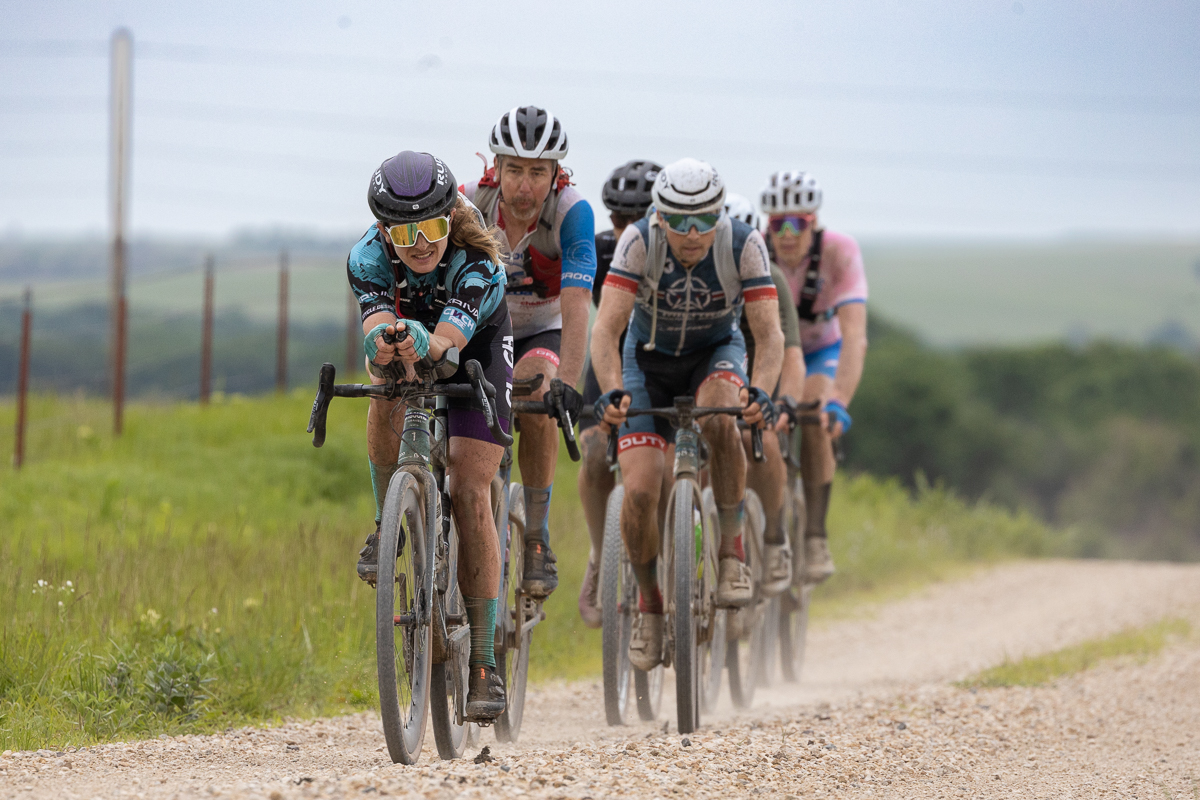Unbound Gravel 200 bans aerobars and adds start groups for elite racers
Riders will be vetted at start lines to enforce new rules in 2023

Unbound Gravel organisers announced two new rule changes that will directly impact the elite riders in the signature 200-mile event in 2023.
Aerobars or bar extensions will no longer be permitted for competitors in the elite field, while the elite men and women riders will now have separate, earlier starts from the mass of amateur riders.
“The pro riders will not be allowed to use aerobars,” was the simple exclamation made Tuesday by Kristi Mohn, Unbound Marketing Manager, speaking to past Unbound 200 men’s champion Ian Boswell on his podcast, Breakfast with Boz.
“The emphasis is on the journey-person athlete. That’s the spirit of gravel.”
In a written statement to media, organisers listed reasons for making the new rule changes for the Unbound Gravel 200 event, which has escalated in attention and prestige as one of the seven pro events in the Life Time Grand Prix off-road series.
Rather than 4,000-plus riders surging down the main street of Emporia, Kansas for the start this year, the elite men will start first, followed two minutes later by the elite women.
Then after eight more minutes the amateur riders will start.
Get The Leadout Newsletter
The latest race content, interviews, features, reviews and expert buying guides, direct to your inbox!
“The changes really affect the front end of the race. There are a handful of little things that will affect the main field,” Seymour said on the podcast.
“We took some rules out of the Unbound rule book that really hadn’t been enforced. Why have a rule if you don’t enforce it?”
In addition, organisers said they would “vet” the elite field for the 200-mile race and “reserve the right to reach out and ask them for credentials to start in this field”.
Both new regulations were confirmed to address safety issues.
“For the first time in the history of Unbound, there will be wave starts for the 200. At this point we are planning on having three waves,” Kimo Seymour, president of Life Time Events which owns and operates Unbound Gravel, said on the podcast.
“The thought is we will send off the elite men, they’ll go first. We want to create a little bit of separation there, one from a safety standpoint to create some separation from the elite women, who will start two minutes after the elite men. The thought there is it creates an opportunity for the elite women, for us to be able to highlight and showcase what is happening at the front end of the women’s field.
“For years we’ve thought about banning aerobars for all participants. The thought process here was that the amateurs are out there a lot longer, let’s put it that way. And for the most part, you end up alone for a lot of your day. Having that extra position that can take a little stress off your shoulders and the neck and make it a little bit more comfortable, if that’s what people need to help them accomplish something like the Unbound 200, then we don’t want to take that away from them.”
Both Seymour and Mohn agreed that they wanted to preserve the “spirit of gravel” and allow any amateur to take the time needed, which can be more than 20 hours rather than the pros’ nine to 10-hour times, to complete a bucket-list event.
“All the amateur riders will have a mass start. This will not affect the “completers”. It will be about eight minutes later. It gives a good enough gap there to let the elite women get pretty far down the road and out onto the course,” Seymour added.
“First and foremost the conversations are always around safety. It is an inherently risky sport. We can’t prevent every accident that is going to happen at our events, but we do look at the risks out there that we can control or at least mitigate. That first hour, it’s chaos. We felt the responsibility to make it safer.”
Other popular off-road events, such as Gravel Worlds and Crusher in the Tushar, have tried something different at the starts and now have the elite women starting first.
Seymour said it works especially well at Crusher since the first 12-15 miles offer a fast track of pavement and a huge climb that separates the field quickly. He said they may consider a change to start waves for the 100-mile event in the future.
Aerobars debate
Ahead of last year's Unbound Gravel, the use of aero bars in off-road racing became a hotly-debated topic.
Cyclingnews listened to opinions from many of the top elite riders, who all mentioned the issue related to safety rather than comfort. While most of the male riders took the side that no one in the front group should use aero bars, the women seemed less decisive, noting that a “gentleman’s agreement” was not enough and clear rules were needed by event organisers.
"I have no idea why it's not an issue on the women's side or if we just don't want any more controversy on any sort of conflict. There's been some eye-rolling, but not a collective conversation like it has been for the men," Amanda Nauman, two-time winner of Unbound Gravel 200, told Cyclingnews in 2022.
She did not use aero bars in her two Unbound 200 wins but did use them in 2021 when she finished second in the 350-mile XL event.
Sofia Gomez Villafane, the women’s 200-mile champion in 2022, felt the pros could manage the use of aerobars safely, and she did her homework for several weeks in advance to adjust to the positioning.
"In the first hour or hour and a half when I was rolling with the elite men, there's such a big group that I didn't use the TT bars. The draft that you get is already a big advantage," Gomez Villafane said prior to her nine-minute win over previous winner Lauren De Crescenzo.
However, with the new rule for the pro women to roll out separately from the men will eliminate the early drafting opportunities that were common in the previous mass starts.
Boswell had expressed concern over the use of aerobars before the 2022 event. His reaction to the new rule?
“I think this is a wonderful rule.”

Jackie has been involved in professional sports for more than 30 years in news reporting, sports marketing and public relations. She founded Peloton Sports in 1998, a sports marketing and public relations agency, which managed projects for Tour de Georgia, Larry H. Miller Tour of Utah and USA Cycling. She also founded Bike Alpharetta Inc, a Georgia non-profit to promote safe cycling. She is proud to have worked in professional baseball for six years - from selling advertising to pulling the tarp for several minor league teams. She has climbed l'Alpe d'Huez three times (not fast). Her favorite road and gravel rides are around horse farms in north Georgia (USA) and around lavender fields in Provence (France), and some mtb rides in Park City, Utah (USA).